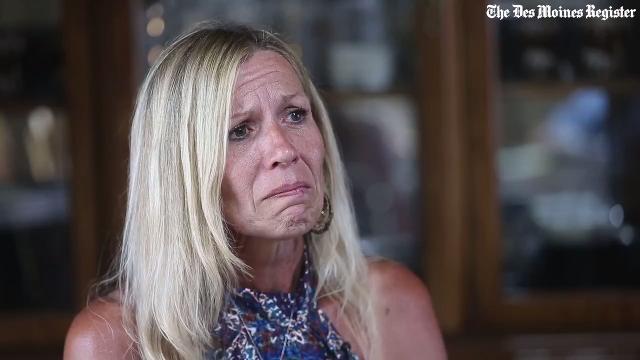
Todd Mouw died in a specialty hospital after changes to his medicaid disrupted his in-home care. His wife, Cydni Mouw, believes those changes in his coverage contributed to his death.
Michael Zamora / The Register
DHS finally acknowledges problems with privatizing Medicaid
There is hope for Iowa’s Medicaid program. Finally, an administrative branch official has publicly acknowledged privatized Medicaid is not working for at least some Iowans.
The state may resume directly overseeing health services for seriously disabled people, Department of Human Services director Jerry Foxhoven said. Doing that could rescue them from the cuts in service realized under private managed care companies.
Foxhoven should follow through with this idea. It opens the door for the state doing what it really needs to do: reclaim the task of directly making care decisions for all Iowa Medicaid beneficiaries.
Numerous Iowa families have reported cuts to services since former Gov. Terry Branstad handed over Medicaid management to three private companies last year. The problems for people with the most severe disabilities have gotten more media attention and prompted a federal lawsuit against the state.
The complaint alleges privatized Medicaid is depriving about 15,000 disabled Iowans with the legal right to live safely outside of care facilities. Though the former governor said their services would not change for at least two years, almost immediately people were told they would receive less care in their homes.
Among the six plaintiffs is Neal Siegel, a former financial consultant who suffered a devastating brain injury in a 2013 bicycle accident. He uses a wheelchair, can barely speak and needs help with nearly every basic life activity.
The managed care company overseeing his Medicaid benefits, AmeriHealth Caritas, abruptly decided to slash payments for his in-home care by more than half per month, from $7,201 to $3,013.
What happens when severely disabled people cannot get help at home? They are forced into a more expensive institution.
That was the case with Tom Mouw of Orange City.
After a vehicle accident left him a quadriplegic more than three decades ago, he was unable to feed himself and needed a ventilator to breathe. State-managed Medicaid paid caregivers to provide daily assistance, which allowed Mouw to remain in his home instead of an institution for many years.
Then Medicaid was privatized. Mouw’s new insurer, Amerigroup, deemed his caregivers not qualified and refused to pay them. He had no choice but to move to a care facility in South Dakota where he died six weeks later.
Fortunately, Iowa now has a DHS director who is willing to publicly recognize the tragic stories being told by Iowans. That is more than can be said for the former agency director, the former governor, the Medicaid director and the current governor, Kim Reynolds.
Foxhoven raised the possibility of exempting some recipients from managed care while speaking last week with an advisory council for his agency. Apparently this is among the ideas being discussed in secret negotiations about payment rates between the state and private insurers.
The companies, which have demanded and received financial bailouts during their short time here, are now trying behind closed doors to wring even more from the state. They would certainly be relieved to give up responsibility for some of the most expensive, disabled patients.
If the state agrees to that, it should slash payments to the companies for all remaining Medicaid beneficiaries.
That would go over like a lead balloon with insurers. Perhaps negotiations over payment rates will drag on for months longer. Perhaps Iowa pays them more and more while they continue to slash services to Iowans.
Foxhoven, a smart attorney who didn’t just fall off the human services’ turnip truck, certainly recognizes this troubling cycle. Instead of more negotiations, he should move toward canceling insurers’ contracts with the state.
Then Iowa can resume directly managing the health care of more than 500,000 poor and disabled people. It can stop funneling precious public health dollars to for-profit companies. It can do what it did for decades: operate a program that kept administrative costs low, contained expenses and paid health providers in a timely manner.
State-managed Medicaid did not force disabled Iowans into expensive, out-of-state institutions where they died a few weeks later. It tried to keep people in their homes.
Iowa’s DHS director may be the only hope for saving the most fragile Iowans from companies that have proven incapable of managing a $4 billion government health insurance program.
